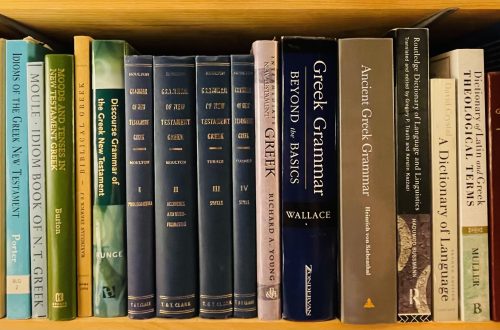 About a week ago, a reporter asked me to comment on the Reza Aslan dust-up. I told the reporter that I had not read Aslan’s book, and I thought that would be the end of that. Nevertheless, he still wanted my comments, so I agreed to talk narrowly about the infamous interview, which I did watch. Even though my academic specialty is New Testament studies, I still haven’t read the book, and I don’t have any plans to do so. Why?
About a week ago, a reporter asked me to comment on the Reza Aslan dust-up. I told the reporter that I had not read Aslan’s book, and I thought that would be the end of that. Nevertheless, he still wanted my comments, so I agreed to talk narrowly about the infamous interview, which I did watch. Even though my academic specialty is New Testament studies, I still haven’t read the book, and I don’t have any plans to do so. Why?
We have to make our priorities when we read, and not every book that comes down the pike is worth the time. You have to have some ability to distinguish the wheat from the chaff even before deciding to read a book straight through. Sometimes you make the decision based on a quick perusal of the table of contents and the introductory chapter. At other times, you do it by reading reviews or watching an interview with the author. My decision not to read Aslan’s book was due to the latter.
After listening to Aslan’s interview, it became very clear that his book was a retread of material that has appeared in numerous works over the last century. It would be a reconstructed Jesus that attempts to get behind the canonical accounts rather than listen to them. As I told the reporter,
Aslan is selling a historically reconstructed Jesus, not the Jesus that appears on the pages of scripture. And that’s the bottom line here. The author doesn’t take the testimony of Matthew, Mark, Luke, and John as reliable eyewitness testimony.
It’s not that I don’t read works that disagree with my own perspective on the reliability of the gospel accounts. I do (see here and here). Nevertheless it’s hard to justify setting aside time to read a work that is breaking no new ground. And apart from an awkward interview, I don’t think anyone would even be talking about the book. It is unremarkable.
Ross Douthat’s review of the book sealed the deal for me.
Aslan’s book offers a more engaging version of the argument Reimarus made 250 years ago. His Jesus is an essentially political figure, a revolutionary killed because he challenged Roman rule, who was then mysticized by his disciples and divinized by Paul of Tarsus.
The fact that Aslan’s take on Jesus is not original doesn’t mean it’s necessarily wrong. But it has the same problem that bedevils most of his competitors in the “real Jesus” industry. In the quest to make Jesus more comprehensible, it makes Christianity’s origins more mysterious.
In other words, there’s nothing new here. We’ve heard all of this before from scholars whose credentials are not in question.
Until the Fox News interview, there has been no buzz about this book among actual New Testament scholars. And it’s easy to see why. So no, I haven’t read the book, and I still don’t plan to.
———-
[If you want to read a really helpful review by a New Testament scholar, I recommend the one by Gary Manning Jr. It’s really well done.]




7 Comments
Pingback:
buddyglass
A case could be made that it’s worth reading simply because it’s a bestseller that deals with Jesus. That is to say, because lots of other people are reading it who might benefit from a cogent critique. Then again there are plenty of people who are qualified to make such a critique, and maybe everything has already been said that needs to be said.
Chris Ryan
I’ve read an excerpt. Its true that Aslan breaks no new ground, but I found that he presented old material in a fresh and interesting way. He doesn’t offer anything in the way of proof for his conjecture (how could he?), but I found his engaging description of the times surrounding Jesus and the Apostles to be useful to those Christians who might not be deeply familiar with those times. As one reviewer said, the fact that there were many Jewish men rebelling and running around claiming to be the Messiah makes the fact that only Jesus is remembered today that much more of a Divine story. If He wasn’t Divine, how would we know Him today?
Also, I think that the context of Christ’s times, which this book discusses, make His message all the more transformational. Jews were so oppressed by the Roman Empire that nearly a thousand of them committed suicide rather than acquiesce to Roman rule during the siege of Masada. That Christ’s message of Love and Peace rose above that suffering to be beloved by millions reinforces the power of that message.
Ken Temple
I am reading Zealot, because Aslan is typical of so many modern westernized Iranians, and because so many young people, atheists, agnostics, secularists, bloggers, etc. are reading it and influenced by Reza Aslan in recent years about the US political policy in the Middle East. Aslan has been the darling of PBS and many media outlets since his book, “No god but God” ( On Islam – he is a modern liberal, westernized Iranian Muslim who uses western secular worldview to say that real Islam is peaceful and that the Wahabis, Salafis, and Jihadists have hijacked true Islam); and he is a frequent guest on the Daily Show and Bill Maher, PBS, etc.
I don’t know much about Reimarus; but Aslan relies on the liberal Jesus Seminar scholars like John P. Meier, John Dominic Crossan, Marcus Borg, Robert Funk, and older liberals like Rudolph Bultmann and many others that I have never heard of before.
I think it is necessary to read Aslan’s book and refute it, because so many who oppose Christianity are promoting it; and much of his presuppositions about the supernatural and miracles are the same basic worldview of Bart Ehrman, J. D. Crossan, and others who assume that the supernatural cannot be allowed in studying history.
If the issue ever comes up; and we say, “there is nothing new there” and the other person asks, “have you read any of it?” and we say, “no”; then they say, “well, how can you say there is nothing new there?” – that is the response I get a lot when evangelizing Muslims who use Bart Ehrman and James D. G. Dunn and E. P. Sanders, Raymond Brown, Geza Vermes, and Dale Allison against the gospels, etc. I have been forced into reading these boring liberal scholars because the new Muslim apologists are reading them, and I at least need to be familiar with the liberal arguments in discussing things intelligently.
Also, as someone who has dealt with secular Iranian Muslims and former Muslims in the west for the last 20 + years – Reza Aslan represents the typical thinking and way that Iranians are dealing with their embarrassment over the 1979 Islamic Revolution of the Ayatollah Khomeini.
Denny Burk
My hunch is that the book will be a flash in the pan. Here today, gone tomorrow, and forgotten. If it proves otherwise and has a more substantial impact, then I suppose I’ll read it.
Pingback:
Pingback: